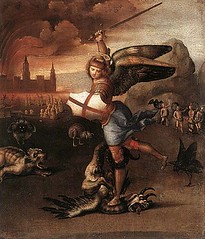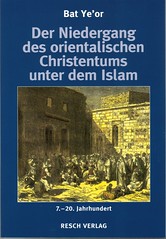Now that we have understood why Islam, the most formidable of heresies, achieved its strength and astounding success we must try to understand why, alone of all the heresies, it has survived in full strength and even continues (after a fashion) to expand to this day.
This is a point of decisive importance to the understanding not only of our subject but of the history of the world in general. Yet it is one which is, unfortunately, left almost entirely undiscussed in the modern world.
Millions of modern people of the white civilization -- that is, the civilization of Europe and America -- have forgotten all about Islam. They have never come in contact with it. They take for granted that it is decaying, and that, anyway, it is just a foreign religion which will not concern them. It is, as a fact, the most formidable and persistent enemy which our civilization has had, and may at any moment become as large a menace in the future as it has been in the past.
To that point of its future menace I shall return in the last of these pages on Mohammedanism.
All the great heresies -- save this one of Mohammedanism -- seem to go through the same phases.
First they rise with great violence and become fashionable; they do so by insisting on some one of the great Catholic doctrines in anexaggerated fashion; and because the great Catholic doctrines combined form the only full and satisfactory philosophy known to mankind, each doctrine is bound to have its special appeal.
Thus Arianism insisted on the unity of God, combined with the majesty and creative power of Our Lord. At the same time it appealed to imperfect minds because it tried to rationalize a mystery. Calvinism again had a great success because it insisted on another main doctrine, the Omnipotence and Omniscience of God. It got the rest out of proportion and went violently wrong on Predestination; but it had its moment of triumph when it looked as though it were going to conquer all our civilization -- which it would have done if the French had not fought it in their great religious war and conquered its adherents on that soil of Gaul which has always been the battle ground and testing place of European ideas.
After this first phase of the great heresies, when they are in their initial vigour and spread like a flame from man to man, there comes a second phase of decline, lasting, apparently (according to some obscure law), through about five or six generations: say a couple of hundred years or a little more. The adherents of the heresy grow less numerous and less convinced until at last only quite a small number can be called full and faithful followers of the original movement.
Then comes the third phase, when each heresy wholly disappears as a bit of doctrine: no one believes the doctrine any more or only such a tiny fraction remain believers that they no longer count. But the social and moral factors of the heresy remain and may be of powerful effect for generations more. We see that in the case of Calvinism today. Calvinism produced the Puritan movement and from that there proceeded as a necessary consequence of the isolation of the soul, the backup of corporate social action, unbridled competition and greed, and at last the full establishment of what we call "Industrial Capital-ism" today, whereby civilization is now imperilled through the discontent of the vast destitute majority with their few plutocratic masters. There is no one left except perhaps a handful of people in Scotland who really believe the doctrines Calvin taught, but the spirit of Calvinism is still very strong in the countries it originally infected, and its social fruits remain.
Now in the case of Islam none of all this happened except the first phase. There was no second phase of gradual decline in the numbers and conviction of its followers. On the contrary Islam grew from strength to strength acquiring more and more territory, converting more and more followers, until it had established itself as a quite separate civilization and seemed so like a new religion that most people came to forget its origin as a heresy.
Islam increased not only in numbers and in the conviction of its followers but in territory and in actual political and armed power until close on the eighteenth century. Less than 100 years before the American War of Independence a Mohammedan army was threatening to overrun and destroy Christian civilization, and would have done so if the Catholic King of Poland had not destroyed that army outside Vienna.
Since then the armed power of Mohammedanism has declined; but neither its numbers nor the conviction of its followers have appreciably declined; and as to the territory annexed by it, though it has lost places in which it ruled over subject Christian majorities, it has gained new adherents -- to some extent in Asia, and largely in Africa. Indeed in Africa it is still expanding among the negroid populations, and that expansion provides an important future problem for the European Governments who have divided Africa between them.
And there is another point in connection with this power of Islam. Islam is apparently unconvertible.
The missionary efforts made by great Catholic orders which have been occupied in trying to turn Mohammedans into Christians for nearly 400 years have everywhere wholly failed. We have in some places driven the Mohammedan master out and freed his Christian subjects from Mohammedan control, but we have had hardly any effect in converting individual Mohammedans save perhaps to some small amount in Southern Spain 500 years ago; and even so that was rather an example of political than of religious change.
Now what is the explanation of all this? Why should Islam alone of all the great heresies show such continued vitality?
Those who are sympathetic with Mohammedanism and still more those who are actually Mohammedans explain it by proclaiming it the best and most human of religions, the best suited to mankind, and the most attractive.
Strange as it may seem, there are a certain number of highly educated men, European gentlemen, who have actually joined Islam, that is, who are personal converts to Mohammedanism. I myself have known and talked to some half-dozen of them in various parts of the world, and there are avery much larger number of similar men, well instructed Europeans, who, having lost their faith in Catholicism or in some form of Protestantism in which they were brought up, feel sympathy with the Mohammedan social scheme although they do not actually join it or profess belief in its religion. We constantly meet men of this kind today among those who have travelled in the East.
These men always give the same answer -- Islam is indestructible because it is founded on simplicity and justice. It has kept those Christian doctrines which are evidently true and which appeal to the common sense of millions, while getting rid of priestcraft, mysteries, sacraments, and all the rest of it. It proclaims and practices human equality. It loves justice and forbids usury. It produces a society in which men are happier and feel their own dignity more than in any other. That is its strength and that is why it still converts people and endures and will perhaps return to power in the near future.
Now I do not think that explanation to be the true one. All heresy talks in those terms. Every heresy will tell you that it has purified the corruptions of Christian doctrines and in general done nothing but good to mankind, satisfied the human soul, and so on. Yet every one of them except Mohammedanism has faded out. Why?
In order to get the answer to the problem we must remark in what the fortunes of Islam have differed from those of all the other great heresies, and when we remark that I think we shall have the clue to the truth.
Islam has differed from all the other heresies in two main points which must be carefully noticed:
(1) It did not rise within the Church, that is, within the frontiers of our civilization. Its heresiarch was not a man originally Catholic who led away Catholic followers by his novel doctrine as did Arius or Calvin. He was an outsider born a pagan, living among pagans, and never baptized. He adopted Christian doctrines and selected among them in the true heresiarch fashion. He dropped those that did not suit him and insisted on those that did -- which is the mark of the heresiarch -- but he did not do this as from within; his action was external.
Those first small but fierce armies of nomad Arabs who won their astounding victories in Syria and Egypt against the Catholic world of the early seventh century were made of men who had all been pagans before they became Mohammedan. There was among them no previous Catholicism to which they might return.
(2) This body of Islam attacking Christendom from beyond its frontiers and not breaking it up from within, happened to be continually recruited with fighting material of the strongest kind and drafted in from the pagan outer darkness.
This recruitment went on in waves, incessantly, through the centuries until the end of the Middle Ages. It was mainly Mongol coming from Asia (though some of it was Berber coming from North Africa), and it was this ceaseless, recurrent impact of new adherents, conquerors and fighters as the original Arabs had been, which gave Islam its formidable resistance and continuance of power.
Not long after the first conquest of Syria and Egypt it looked as though the enthusiastic new heresy, in spite of its dazzling sudden triumph, would fail. The continuity in leadership broke down. So did the political unity of the whole scheme. The original capital of the movement was Damascus and at first Mohammedanism was a Syrian thing (and, by extension, an Egyptian thing); but after quite a short time a break-up was apparent. A new dynasty began ruling from Mesopotamia and no longer from Syria. The Western Districts, that is North Africa and Spain (after theconquest of Spain), formed a separate political government under aseparate obedience. But the caliphs at Baghdad began to support themselves by a bodyguard of hired fighters who were Mongols from the steppes ofAsia.
The characteristic of these nomadic Mongols (who come after the fifth century over and over again in waves to the assault against our civilization), is that they are indomitable fighters and at the same time almost purely destructive. They massacre by the million; they burn and destroy; they turn fertile districts into desert. They seem incapable of creative effort.
Twice we in the Christian European West have barely escaped final destruction at their hands; once when we defeated the vast Asiatic army of Attila near Chalons in France, in the middle of the fifth century (not before he had committed horrible outrage and left ruin behind him everywhere), and again in the thirteenth century, 800 years later. Then the advancing Asiatic Mongol power was checked, not by our armies but by the death of the man who had united it in his one hand. But it was not checked till it reached north Italy and was approaching Venice. It was this recruitment of Mongol bodyguards in successive instalments which kept Islam going and prevented its suffering the fate that all other heresies had suffered. It kept Islam thundering like a battering ram from outside the frontiers of Europe, making breaches in our defence and penetrating further and further into what had been Christian lands.
The Mongol invaders readily accepted Islam; the men who served as mercenary soldiers and formed the real power of the Caliphs were quite ready to conform to the simple requirements of Mohammedanism. They had no regular religion of their own strong enough to counteract the effects of those doctrines of Islam which, mutilated as they were, were in the main Christian doctrines -- the unity and majesty of God, the immortality of the soul and all the rest of it. The Mongol mercenaries supporting the political power of the Caliphs were attracted to these main doctrines and easily adopted them. They became good Moslems and as soldiers supporting the Caliphs were thus propagators and maintainers of Islam.
When in the heart of the Middle Ages it looked as though again Islam had failed, a new batch of Mongol soldiers, "Turks" by name, came in and saved the fortunes of Mohammedanism again although they began by the most abominable destruction of such civilization as Mohammedanism had preserved. That is why in the struggles of the Crusades Christians regarded the enemy as "The Turk"; a general name common to many of these nomad tribes. The Christian preachers of the Crusades and captains of the soldiers and the Crusaders in their songs speak of "The Turk" as the enemy much more than they do in general of Mohammedanism.
In spite of the advantage of being fed by continual recruitment, the pressure of Mohammedanism upon Christendom might have failed after all, had one supreme attempt to relieve that pressure upon the Christian West succeeded. That supreme attempt was made in the middle of the whole business (A.D. 1095-1200) and is called in history "The Crusades."
Catholic Christendom succeeded in recapturing Spain; it nearly succeeded in pushing back Mohammedanism from Syria, in saving the Christian civilization of Asia, and in cutting off the Asiatic Mohammedan from the African. Had it done so perhaps Mohammedanism would have died.
But the Crusades failed. Their failure is the major tragedy in the history of our struggle against Islam, that is, against Asia -- against the East.
Continued
Monday, October 1, 2007
The Great and Enduring Heresy of Mohammed – by Hilaire Belloc - 03
Subscribe to:
Post Comments (Atom)




No comments:
Post a Comment